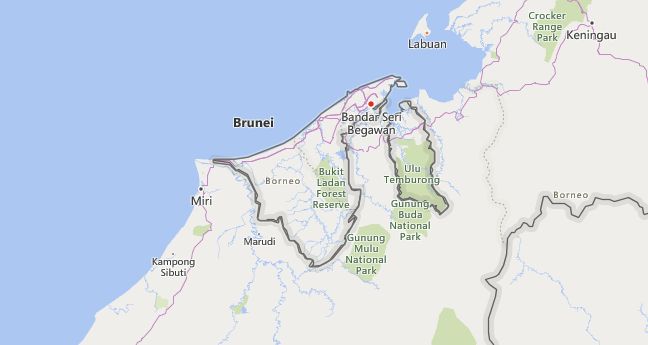There are 2 high school codes in Brunei Darussalam today, according to the ACT. The full list is shown below by city, with name of each high school and the city where the school is located (based on the ACT official site). You can search a school code by pressing “Ctrl” + “F” and then type school name or 6-digit school code.
Map of Brunei
High School Codes by City
- High School Code
- 652011
- High School Code
- 652010
The above lists CEEB codes (College Entrance Examination Board) for all accredited Brunei high schools. Please be informed that the list of high school codes in Brunei may change throughout the year. If you can’t find codes for the high schools of your interest, please write to us or come back at a later time. We will update our database soon after a new high school code is added to the country of Brunei.
Country Abbreviations
BRN is the three-letter country code of Brunei, and BN is the two-letter country code of Brunei. The two-letter suffix is used in top-level domains on the Internet as .bn.
Population and Religion
Population
Two thirds of the population are Malays, 10% Chinese, around 3% Iban and other indigenous peoples. Almost every fifth resident lives as a guest worker in Brunei, including Europeans, Indonesians, Thais, Indians and others. The population density (2017) is 81 residents / km 2. The majority live in the urban centers in the coastal area (especially in the capital Bandar Seri Begawan , in Seria and Kuala Belait), the less developed hinterland is almost uninhabited. The proportion of the urban population is 78%.
Social: The local population benefits from the extensive social benefits. Health care is well developed and free for citizens.
Religion
The constitution defines Islam as the state religion and protects, also with regard to non-Islamic religions, the right to exercise religion freely if this occurs in “peace and harmony” with the Islamic state and social order. Officially (2011) around 79% of the population are Muslims, Sunnis from the Shafiite school of law. Around 9% of the population are Christians (mostly Catholics; besides Protestants and Anglicans), just under 8% Buddhists and around 1% Hindus. In addition to Buddhism, Chinese folk religions, Daoism and Confucianism are practiced within the Chinese population group. Traditional ethnic religions have survived among the indigenous population.
Politics and law
Politics
Since January 1st, 1984 Brunei has been an independent Islamic sultanate in the Commonwealth. The (several times modified) constitution of September 29, 1959 applies, which was partially suspended in 1962 after the state of emergency was imposed (still in force today). The head of state and head of government is the sultan, who is assisted by four councils with an advisory function: the council of ministers appointed by him, the privy council (for constitutional questions and acts of grace), the heir apparent and a council for religious matters. On September 25, 2004, the Legislative Council, which had been suspended since 1984 (33 members appointed by the Sultan since 2011), resumed its work; until then, laws were usually passed by the sultan by decree.
Parties
Parties have no political influence. The National Development Party (NDP; German National Development Party) is officially approved.
Unions
There are three official union federations, including the Brunei Oilfield Workers’ Union.
Military
The total strength of the volunteer army is 7,000 and the paramilitary police force is 3,500. The army troops (5,000 soldiers) are essentially divided into three infantry battalions. The Air Force and Navy each have 1,000 men.
Administration
Below the government level, Brunei is divided into 4 districts.
Law
The legal system is based on English common law. In certain areas, in particular family and personal law, Islamic law is decisive for Muslims. The three-tier court system consists of the subordinate courts or magistrate courts, the intermediate court and the supreme court. The Supreme Court, whose judges are appointed by the Sultan for three years each, consists of the Court of Appeal and the High Court. The appellate court is the appellate instance for decisions of the high and middle courts. The British Privy Council in London can be involved in civil law decisions. For the Islamic law , Sharia courts have jurisdiction.
Education
The education system is considered to be well developed. There is general compulsory schooling between the ages of 6 and 15. School fees are not charged. Primary school lasts six years. In the secondary school sector there is the three-year Junior Secondary School (12-15 years), the two-year Senior Secondary School (15-17 years) and two-year courses that prepare students for university (Sixth Form). With the exception of Arabic in the religious area, the languages of instruction at all public institutions have only been Malay and English since 1985. The state-owned University of Brunei Darussalam was founded in 1985. Talented students are granted a scholarship abroad.
Media
The media are controlled by the state. Broad and critical reporting is prevented by strict media laws and self-censorship.
Press: All newspapers except for the »Brunei Times« (in English) belong to the state or the family of the ruling sultan, including the daily newspapers »Borneo Bulletin« (founded 1953, English) and »Media Permata« (founded 1995, Malay) as well as Wochen – and monthly sheets.
Broadcasting: The state-run Radio Television Brunei (RTB, founded in 1957) broadcasts five radio and five television programs in Malay, English and Chinese. Pay TV from Kristal-Astro, a joint venture between the mobile communications company DST Communications and a Malaysian company, can be received via satellite. The only private radio station is »Kristal FM«.

